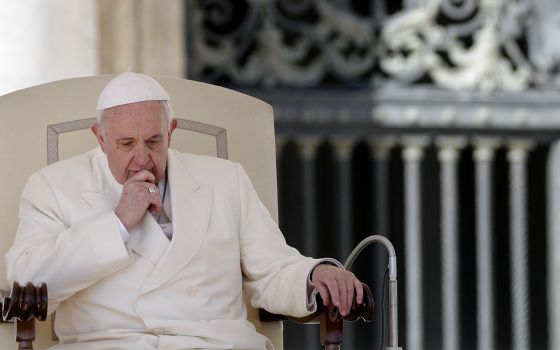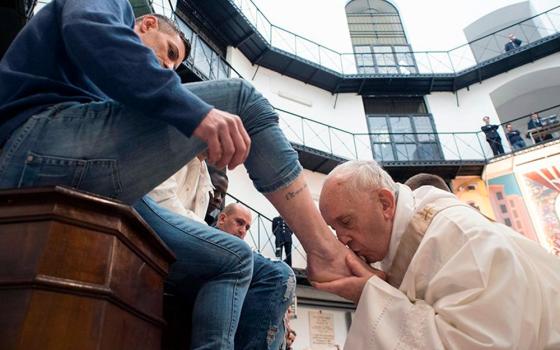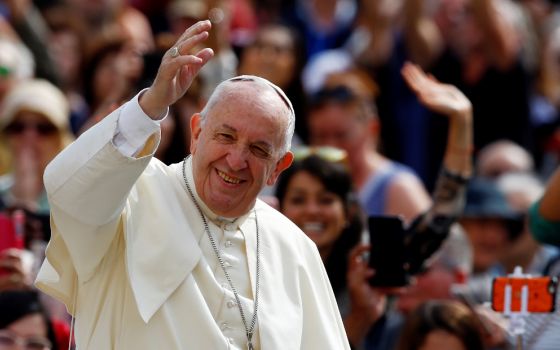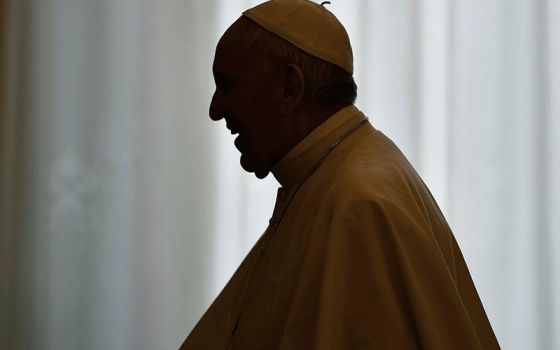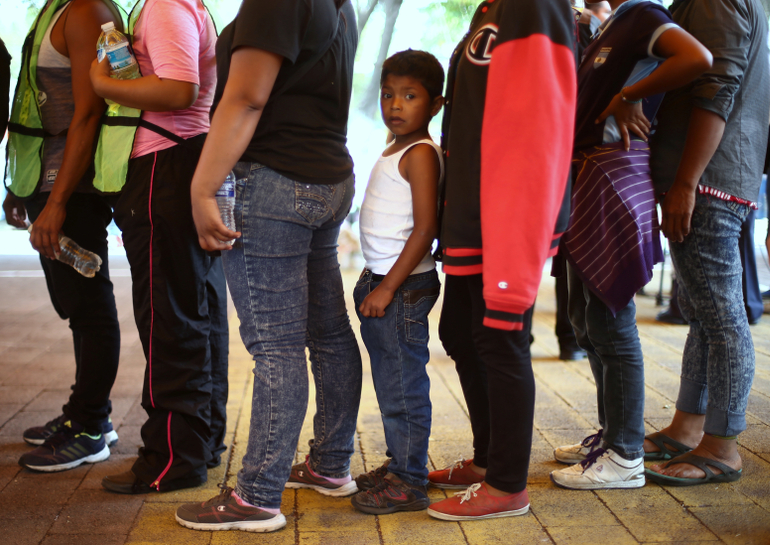
Central American migrants stand in line for food at a shelter set up for them by the Catholic Church in Puebla, Mexico, April 6. (CNS photo/Edgard Garrido, Reuters)
Christians cannot quest for holiness with prayer alone but must strive to serve those most in need, particularly migrants "who risk their lives to offer a future to their children," Pope Francis says in a new major teaching document.
In an often-poetic 98-page apostolic exhortation focused on how Christians can be holy in today's world, the pontiff says the most basic teaching handed on by Jesus is to help others, "without any 'ifs or buts.'"
At the heart of the new papal letter, titled Gaudete et Exsultate ("Rejoice and Be Glad") and released April 9, is a reflection on the great criterion Jesus said will be used at the final judgment: "I was hungry and you gave me food, I was thirsty and you gave me drink, I was a stranger and you welcomed me."
"Given these uncompromising demands of Jesus, it is my duty to ask Christians to acknowledge and accept them in a spirit of genuine openness, sine glossa," the pontiff states at one point in the letter. "Our Lord made it very clear that holiness cannot be understood or lived apart from these demands."
Providing the example of someone who encounters a homeless person sleeping outdoors on a cold night, the pope states: "I can view him or her as an annoyance ... or I can respond with faith and charity, and see in this person a human being with a dignity identical to my own."
"That is what it is to be a Christian!" Francis exclaims. "Can holiness somehow be understood apart from this lively recognition of the dignity of each human being?"
Turning later to the treatment of migrants, the pontiff says that in Catholic discussions of public policy the situation faced by the record numbers of people fleeing violence and war in our days is often seen as a "lesser issue" compared to so-called "'grave' bioethical questions."
"That a politician looking for votes might say such a thing is understandable, but not a Christian, for whom the only proper attitude is to stand in the shoes of those brothers and sisters of ours," the pope responds.
"Can we not realize that this is exactly what Jesus demands of us, when he tells us that in welcoming the stranger we welcome him?" Francis asks, before citing the example of the 6th century founder of the Benedictine order, St. Benedict of Nursia, who, "though it might have 'complicated' the life of his monks ... ordered that all guests who knocked at the monastery door be welcomed 'like Christ.'"
Citing from God's command to the people of Israel in Exodus -- "You shall not wrong a stranger or oppress him, for you yourselves were strangers in the land of Egypt" -- the pontiff states plainly: "This is not a notion invented by some Pope, or a momentary fad."
Gaudete et Exsultate, released with relatively little fanfare after only a few weeks of expectation, is the fifth major document authored by Francis over his five-year papacy, following the encyclicals Lumen Fidei and Laudato Si', and the exhortations Evangelii Gaudium and Amoris Laetitia.
The letter, which unfolds over 177 numbered points and five chapters, is marked by a very personal tone. The pontiff frequently addresses the reader individually throughout the text as "you," and asks direct questions meant to help each person examine their own quest for holiness.
The document culminates in the final chapter with a long reflection on the need for Christians to practice discernment, or to listen to what God is calling them to do with their lives.
The prominent section of the letter is contained in its third and fourth chapters. In the third chapter, Francis addresses each of the Beatitudes, as given by Jesus in Matthew's Gospel, and reflects on how Christians can live them in their ordinary lives.
In the fourth chapter, the pontiff then examines five spiritual attitudes he says are "necessary" to understand how to best put Jesus' teachings practice.
Repeatedly, the pope stresses the need for Christians to both pray and serve others. In one example, after reflecting on the meaning of the great criterion, Francis cites from a question St. Thomas of Aquinas asked in his Summa Theologiae about which of a human's works best showed love of God.
"Thomas answered unhesitatingly that they are the works of mercy towards our neighbor, even more than our acts of worship," states the pope, before quoting Thomas: "We worship God by outward sacrifices and gifts, not for his own benefit, but for that of ourselves and our neighbor."
The pontiff also criticizes Christians who focus on one ethical issue, such as abortion, over and above all others, calling that a "harmful ideological error."
Reaffirming that Catholic opposition to abortion "needs to be clear, firm and passionate, for at stake is the dignity of a human life, which is always sacred," Francis continues: "Equally sacred, however, are the lives of the poor, those already born, the destitute, the abandoned and the underprivileged."
"We cannot uphold an ideal of holiness that would ignore injustice in a world where some revel, spend with abandon and live only for the latest consumer goods, even as others look on from afar, living their entire lives in abject poverty," says the pope.
Gaudete et Exsultate is signed March 19, the feast of St. Joseph and the fifth anniversary of Francis' inauguration into Petrine ministry after his March 13, 2013 election to the papacy.
The document has a widely diverse range of citations among its 125 footnotes, including: 20th century Swiss theologian Fr. Hans Urs von Balthasar, 11th century St. Hildegard of Bingen, deceased Italian Cardinal Carlo Martini, and numerous other saints, including: Augustine, Bonaventure, Thomas More, and Teresa of Avila.
It also cites frequently from documents released by bishops' conferences around the world, including those from New Zealand, the regional West African conference, the Canadian bishops' social affairs commission, the Latin America and Caribbean regional episcopal conference, and the Indian bishops' conference.
Discernment: 'constant battle' against Devil
The final chapter presents discernment as the way a Christian can prevail in what Francis calls the "constant battle" against the temptations of the devil. The pope says it is important that Christians think of the devil not in symbolic terms, but as an evil being at work in the world.
Commenting on the last words of the Our Father prayer -- "deliver us from evil" -- the pontiff says: "a more exact translation would be 'the evil one.'"
"It indicates a personal being who assails us," says Francis. "Jesus taught us to ask daily for deliverance from him, lest his power prevail over us."
"How can we know if something comes from the Holy Spirit or if it stems from the spirit of the world or the spirit of the devil?" the pope asks later, answering: "The only way is through discernment, which calls for something more than intelligence or common sense."
"Often discernment is exercised in small and apparently irrelevant things, since greatness of spirit is manifested in simple everyday realities," he continues. "It involves striving untrammelled for all that is great, better and more beautiful, while at the same time being concerned for the little things, for each day’s responsibilities and commitments."
Making his second of two requests in the document for how Christians should act after the request to help those in need, Francis states: "For this reason, I ask all Christians not to omit, in dialogue with the Lord, a sincere daily 'examination of conscience.'"
Describing the process of discernment more specifically, the pontiff says it involves listening to God in prayer and being open to changes, even when they are surprising or go against the grain.
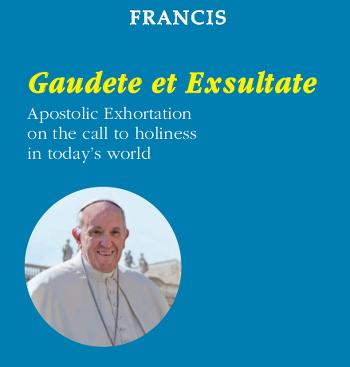
The cover of the Vatican publishing house's printing of 'Gaudete et Exsultate' (Provided photo)
While the pope says that listening "entails obedience to the Gospel as the ultimate standard [and] also to the Magisterium that guards it," he also states: "It is not a matter of applying rules or repeating what was done in the past, since the same solutions are not valid in all circumstances and what was useful in one context may not prove so in another."
"The discernment of spirits liberates us from rigidity, which has no place before the perennial 'today' of the risen Lord," he says.
"Discernment is not about discovering what more we can get out of this life, but about recognizing how we can better accomplish the mission entrusted to us at our baptism," he continues later. "This entails a readiness to make sacrifices, even to sacrificing everything."
'The genius of woman'
Francis opens the exhortation with two chapters exploring the step-by-step nature of becoming holy, and then warning against what he calls "two subtle enemies" of holiness.
In the first section, the pontiff stresses the Second Vatican Council's teaching that holiness is not primarily obtained by individuals, but by the whole community, quoting Lumen Gentium: "In salvation history, the Lord saved one people. We are never completely ourselves unless we belong to a people. That is why no one is saved alone, as an isolated individual."
The pope then considers how each person has their own path to holiness. He gives particular consideration to what he calls "the 'genius of woman,'" or, "feminine styles of holiness, which are an essential means of reflecting God’s holiness in this world."
"In times when women tended to be most ignored or overlooked, the Holy Spirit raised up saints whose attractiveness produced new spiritual vigor and important reforms in the Church," says Francis, citing the examples of Sts. Hildegard of Bingen, Bridget, Catherine of Siena, Teresa of Avila and Thérèse of Lisieux.
The pontiff explains how we grow in holiness step-by-step, using the example of a woman who goes shopping, meets a friend and is tempted to gossip but does not. She then goes home and wants to rest, but her child wants to speak to her. She listens to them instead of resting.
"This is a step forward in holiness ... one more step," Francis comments after each instance.
"You too need to see the entirety of your life as a mission," the pope tells the reader. "Try to do so by listening to God in prayer and recognizing the signs that he gives you. Always ask the Spirit what Jesus expects from you at every moment of your life and in every decision you must make."
The "two subtle enemies" of holiness that Francis identifies are new forms of the ancient heresies of Gnosticism, which stresses improving oneself through knowledge or insight; and Pelagianism, which stresses an individual's ability to earn their salvation through prayer or other works.
Commenting on Gnosticism, which he calls "one of the most sinister ideologies," the pontiff warns: "When somebody has an answer for every question, it is a sign that they are not on the right road."
"God infinitely transcends us; he is full of surprises," states the pope. "We are not the ones to determine when and how we will encounter him; the exact times and places of that encounter are not up to us. Someone who wants everything to be clear and sure presumes to control God’s transcendence."
"Nor can we claim to say where God is not, because God is mysteriously present in the life of every person, in a way that he himself chooses, and we cannot exclude this by our presumed certainties," Francis continues. "Even when someone’s life appears completely wrecked, even when we see it devastated by vices or addictions, God is present there."
The pontiff also warns that knowing church doctrine well can limit a person's openness to growth, or to hearing where God is leading them now. He quotes a letter St. Francis of Asissi wrote to St. Anthony of Padua: "I am pleased that you teach sacred theology to the brothers, provided that ... you do not extinguish the spirit of prayer and devotion during study of this kind."
Says Francis: "Not infrequently, contrary to the promptings of the Spirit, the life of the Church can become a museum piece or the possession of a select few. This can occur when some groups of Christians give excessive importance to certain rules, customs or ways of acting."
"Amid the thicket of precepts and prescriptions, Jesus clears a way to seeing two faces, that of the Father and that of our brother," the pontiff states later. "He does not give us two more formulas or two more commands. He gives us two faces, or better yet, one alone: the face of God reflected in so many other faces."
The Beatitudes, 'a Christian's identity card'
In the prominent middle section of Gaudete et Exsultate, Francis begins his examination of each of the Beatitudes by saying "nothing is more enlightening than turning to Jesus’ words and seeing his way of teaching the truth."
"Jesus explained with great simplicity what it means to be holy when he gave us the Beatitudes," the pope continues. "The Beatitudes are like a Christian's identity card. So if anyone asks: 'What must one do to be a good Christian?,' the answer is clear."
Of the first Beatitude -- "Blessed are the poor in spirit, for theirs is the kingdom of heaven" -- the pontiff states bluntly: "Wealth ensures nothing."
"Once we think we are rich, we can become so self-satisfied that we leave no room for God’s word, for the love of our brothers and sisters, or for the enjoyment of the most important things in life," he states. "In this way, we miss out on the greatest treasure of all."
Of the second Beatitude -- "Blessed are the meek, for they will inherit the earth" -- Francis says: "These are strong words in a world that from the beginning has been a place of conflict, disputes and enmity on all sides."
"Impossible as it may seem, Jesus proposes a different way of doing things: the way of meekness," he states.
"Meekness is yet another expression of the interior poverty of those who put their trust in God alone," the pope continues a few paragraphs later.
"Indeed, in the Bible the same word – anawim – usually refers both to the poor and to the meek," he says. "Someone might object: 'If I am that meek, they will think that I am an idiot, a fool or a weakling.' At times they may, but so be it. It is always better to be meek, for then our deepest desires will be fulfilled."
Of the fifth Beatitude -- "Blessed are the merciful, for they will receive mercy" -- Francis speaks poetically, citing Misericordiae Vultus ("The Face of Mercy"), the bull he wrote declaring the 2015-16 extraordinary Jubilee year of mercy.
"Giving and forgiving means reproducing in our lives some small measure of God’s perfection, which gives and forgives superabundantly," says the pope.
"The yardstick we use for under- standing and forgiving others will measure the forgiveness we receive," he continues. "The yardstick we use for giving will measure what we receive. We should never forget this."
"We need to think of ourselves as an army of the forgiven," Francis says, before citing from Jesus' parable of the unforgiving servant.
"All of us have been looked upon with divine compassion," he continues. "If we approach the Lord with sincerity and listen carefully, there may well be times when we hear his reproach: 'Should not you have had mercy on your fellow servant, as I had mercy on you?'"
Ending the chapter, Francis states plainly: "Jesus’ words are few and straightforward, yet practical and valid for everyone, for Christianity is meant above all to be put into practice."
"I recommend rereading these great biblical texts frequently, referring back to them, praying with them, trying to embody them," he continues. "They will benefit us; they will make us genuinely happy."
Advertisement
'Verbal violence' on social media
After examining the Beatitudes, Francis says he wants to turn to "five great expressions of love for God and neighbor that I consider of particular importance in the light of certain dangers and limitations present in today's culture."
"The first of these great signs is solid grounding in the God who loves and sustains us," the pontiff explains. "This source of inner strength enables us to persevere amid life’s ups and downs, but also to endure hostility, betrayal and failings on the part of others."
The pope then takes a detour to sharply criticize Catholics who take part in what he calls "verbal violence" on the Internet and through social media.
"Even in Catholic media, limits can be overstepped, defamation and slander can become commonplace, and all ethical standards and respect for the good name of others can be abandoned," he states.
"The result is a dangerous dichotomy, since things can be said there that would be unacceptable in public discourse, and people look to compensate for their own discontent by lashing out at others," the pope continues.
"It is striking that at times, in claiming to uphold the other commandments, they completely ignore the eighth, which forbids bearing false witness or lying, and ruthlessly vilify others," he states.
The third of Francis' signs is boldness and passion. Using the Greek word parrhesía, the pope defines it as "an impulse to evangelize and to leave a mark in this world."
"How often we are tempted to keep close to the shore!" the pontiff exclaims. "Yet the Lord calls us to put out into the deep and let down our nets. He bids us spend our lives in his service."
"We need the Spirit’s prompting, lest we be paralyzed by fear and excessive caution, lest we grow used to keeping within safe bounds," Francis states some paragraphs later.
"Let us remember that closed spaces grow musty and unhealthy," he asks. "When the Apostles were tempted to let themselves be crippled by danger and threats, they joined in prayer to implore parrhesía."
"God is eternal newness," says the pope. "He impels us constantly to set out anew, to pass beyond what is familiar, to the fringes and beyond. He takes us to where humanity is most wounded, where men and women, beneath the appearance of a shallow conformity, continue to seek an answer to the question of life’s meaning."
Francis fourth and fifth signs of holiness are being in community and in constant prayer.
"When we live apart from others, it is very difficult to fight against concupiscence, the snares and temptations of the devil and the selfishness of the world," the pontiff explains. "Bombarded as we are by so many enticements, we can grow too isolated, lose our sense of reality and inner clarity, and easily succumb."
"Growth in holiness is a journey in community, side by side with others," the pope states later.
Speaking of the need for prayer life, Francis states: "We should remember that holiness consists in a habitual openness to the transcendent, expressed in prayer and adoration. The saints are distinguished by a spirit of prayer and a need for communion with God."
"They find an exclusive concern with this world to be narrow and stifling, and, amid their own concerns and commitments, they long for God, losing themselves in praise and contemplation of the Lord," the pope continues, adding: "I do not believe in holiness without prayer, even though that prayer need not be lengthy or involve intense emotions."
Francis then makes a series of queries to the reader.
"Are there moments when you place yourself quietly in the Lord’s presence, when you calmly spend time with him, when you bask in his gaze?" he asks. "Do you let his fire inflame your heart?"
"Unless you let him warm you more and more with his love and tenderness, you will not catch fire," he continues. "How will you then be able to set the hearts of others on fire by your words and witness?"
[Joshua J. McElwee is NCR Vatican correspondent. His email address is jmcelwee@ncronline.org. Follow him on Twitter: @joshjmac.]




